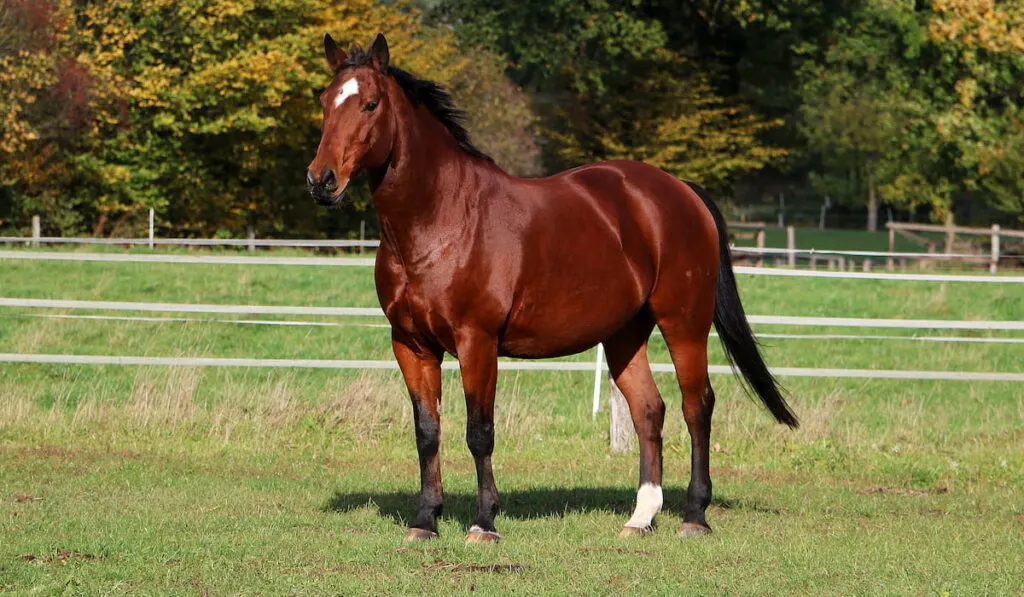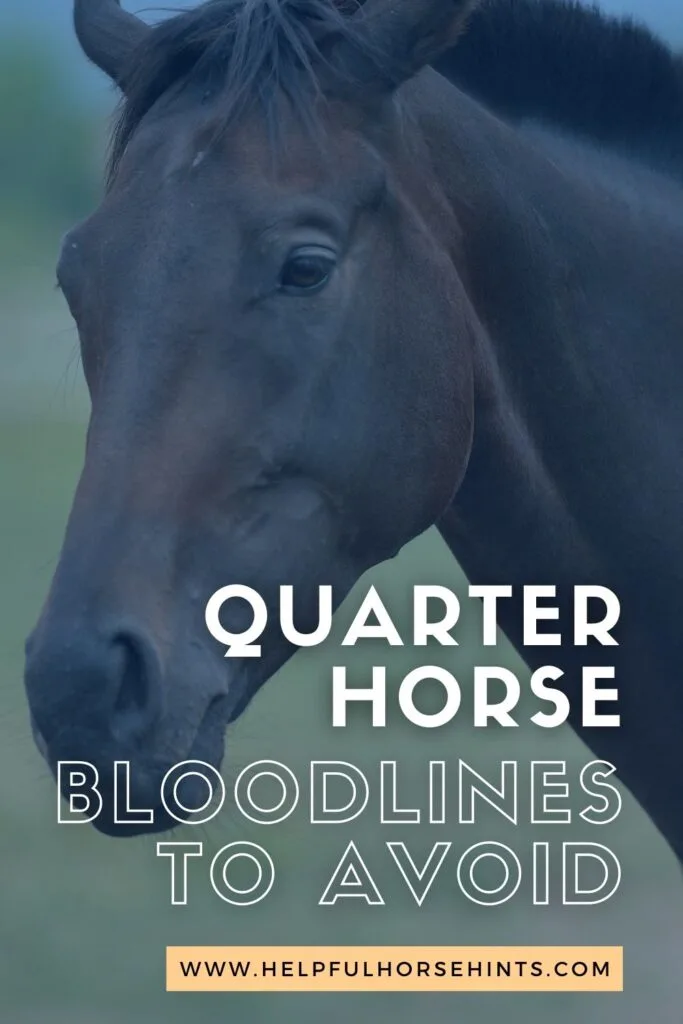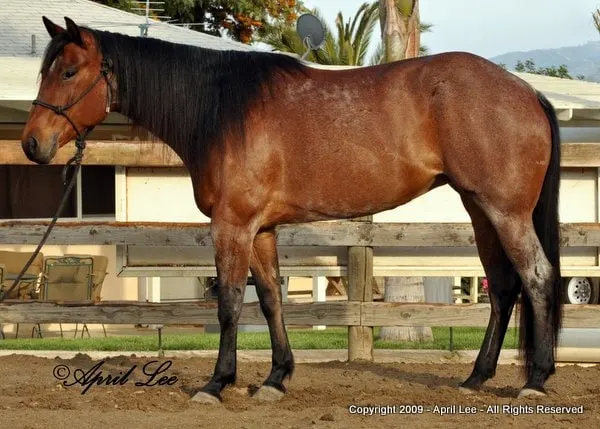Many people will tell you to steer clear of certain American Quarter Horse bloodlines, but do you know exactly why? Several previously popular Quarter Horse bloodlines have now been linked to potentially fatal genetic diseases, as well as to some behavioral issues.

There are a few Quarter Horse bloodlines that you should avoid, or at least research the horse extremely thoroughly, whenever possible. These bloodlines include some very famous names, including Poco Bueno, King, Impressive and even Joe Hancock.
Although these stallion lines were extremely popular at one time, today these bloodlines are just as well known for their genetic flaws and even difficult temperaments.
Of course, it would be nice if you did not have to worry about particular bloodlines, and could choose your horse based solely on its own merit. The truth is, you should always study a horse’s bloodlines, especially if it is a Quarter Horse.
Some of the bloodlines have serious, known genetic issues and should be tested or be able to show proof they are clear of the issues prevalent in their line. Other bloodlines just have a bad reputation for being difficult.
In either case, you should absolutely evaluate each specific horse as an individual and not discount the bloodline as a whole.
You came to this article looking for bloodlines to avoid, this is my list and I’ve owned amazing horses with every single bloodline listed on here so I just wanted to clarify that I absolutely know that excellent, disease-free and temperamentally stable horses exist in EVERY bloodline.
Before purchasing a Quarter Horse, it’s a good idea to learn all you can about the bloodlines you should avoid. That way you can make the best decision and avoid a lot of expensive and heartbreaking problems.

Table of Contents
Poco Bueno and HERDA
One Quarter Horse bloodline you should definitely avoid traces to the stallion Poco Bueno. This popular sire in the 1950s has been scientifically linked to a fatal skin disease called HERDA, of hereditary equine regional dermal asthenia.
Poco Bueno was a breathtaking American Quarter Horse stallion born in 1944. He was successful in the show ring as well as in the equine sport of cutting and went on to produce 405 foals.
HERDA, also known as hyperelatosis cutis, is a serious equine disease that is eventually 100% fatal. Basically, with this disease, the horse lacks the normal amount of collagen needed to hold their multiple layers of skin together.
Any pressure, including that of a saddle, can easily cause the skin to separate, tear and even peel off the horse’s body. It can even happen with little to no pressure or trauma. There is no cure, only treatments and measures owners can take to try to lengthen the horse’s life as long as possible.
HERDA first appeared on the horse scene in 1971. As more horses began being diagnosed with HERDA, researchers worked to find the cause.
Eventually, they found that the bulk of HERDA-inflicted horses could be traced back directly to Poco Bueno – 95% of affected horses tested had Poco Bueno lineage in both their sire and dams.
This means that if a horse’s mother and father both can be traced back to Poco Bueno, then that horse has a higher chance of developing HERDA.
The more line bred the horse is, the greater it’s chances are of having this disease. Likewise, if the horse only traces to Poco Bueno on one side, the chance of the horse being affected would be less than 1%.
This disease does not usually present until the horse begins training, usually around the age of 2 or 3, when a saddle or rider causes pressure on the horse’s skin, forcing the separation and subsequent injury.
Always scan a potential horse’s papers for any mention of Poco Bueno before purchasing. Also watch out for or one of his most popular sons Doc O’Lena, another well-known carrier of the disease.
If your horse is an adult, it may not show signs of HERDA but it could very well be a carrier, and that’s important to know if you are thinking about breeding your horse.
Be sure to check out my article on Horse DNA Tests for my recommendations for labs in the United States.

King and GBED
Another Quarter Horse bloodline that you may want to avoid is the King lineage. Although popular in the past, the King bloodline is now known to be linked to GBED, or glycogen-branching enzyme disorder. This fatal disease has afflicted Quarter Horse foals for many decades.
King, also referred to as King-P234, was an exceptional bay stallion born in 1932. He performed well in roping events and was an excellent ranch horse. He went on to sire numerous Quarter Horses, many of which became famous including Royal King, Martha King and Poco Bueno.
Unfortunately, a fatal gene mutation can occur with some horses that carry the King-P234 lineage. The mutation causes the cells within a horse to not recognize the GBR gene, which in turn makes its body unable to produce the GB enzyme. Without this, the horse cannot store sugar properly and they will die within days or, at maximum, 2 months.
There is a 100% mortality rate for any foal diagnosed with GBED. Luckily, only a small percentage of horses with the King bloodline are carriers of this mutation, and a test can be done to detect those can potentially pass on the disease to their offspring.
The more line bred a horse is to King, the higher it’s chances of carrying the disease. Keep in mind that a GBED positive result in King descendants is not an issue if you never plan on breeding your horse.
Steer clear of the King bloodline if you can, but if you already have a horse with this lineage consult with your vet about having him or her tested, especially if you plan on breeding.
Impressive and HYPP
The bloodline of the stallion Impressive dominated the American Quarter Horse world for many years. Today it is well known as a direct link to a genetic illness called HYPP or hyperkalemic periodic paralysis.
This disease causes the muscle cells in a horse to be unable to handle any potassium that they eat. Ingestion of any foods that contain potassium in a horse with HYPP can cause serious muscle twitching and weakness which can lead to an inability to move and function properly.
A particularly severe attack can even lead to death because the symptoms can prevent them from breathing.
While the symptoms in some horses with HYPP can often be managed with strict feeding regimens, the disease is sometimes more severe in certain horses.
Born in 1969, Impressive was a gorgeous sorrel stallion who was registered with the American Quarter Horse Association, the AQHA, in 1971. Within 3 years, he was the World Champion Open Aged Halter stallion.
He excelled in the show ring for years and went on to sire an astonishing 2,250 foals! Out of those, almost 30 of them became World Champion title winners as well.
Impressive did not suffer from HYPP himself, but as time went on, his bloodline was time and again linked to the debilitating disease. In fact, it is only horses with a genetic link to Impressive that can have the condition.
In an effort to prevent further spread of the illness, the AQHA has even banned the registration of any horses that are relatives of Impressive and who test homozygous positive for HYPP (H/H).
Joe Hancock and Bucking
Yet another Quarter Horse bloodline that many experts suggest avoiding is Joe Hancock. While some may highly recommend this bloodline, others believe that horses with this lineage are prone to bucking.
Joe Hancock was a brown stallion born in 1926 that was actually well-known for his calm demeanor and level-headedness. Over the years, some of his offspring developed a penchant for bucking, particularly those sired by his son Roan Hancock.
While these occurrences were not the standard, their existence caused many horse enthusiasts to brand the Joe Hancock bloodline as ‘prone to bucking’.
There are always exceptions to every rule
Just because many horse owners will steer you away from the bloodlines mentioned here – and even some others – you don’t need to exclude a horse based solely on its lineage. While it is important to know your horse’s history, bloodlines should give you more of an idea for what issues to look out for.
You can test for many genetic disorders. Even if your horse is a carrier of certain illness-inducing genes, if you do not plan on breeding it the issue may be moot.
Behavioral issues like bucking or hard-headedness may only be situational and in the right hands, a “bad” horse could turn out to be an extraordinary one. Sometimes a tendency to bucking may be caused by a simple issue of built-up energy, poor training, or other easily treatable conditions, and not a genetic disorder.
Just like there are people who suggest avoiding particular Quarter Horse bloodlines, there are just as many that will regale you with stories about their “bad” bloodline horse that was perfect in every way, despite its lineage.

Even though descendants of Roan Hancock are often tied to bucking issues, I once had an exceptional bay mare with the Hancock bloodline and she was a calm, trustworthy horse who never once bucked when I rode her.
If I had listened to the naysayers, I would have honestly missed out on one of the best horses I ever had!
Final Thoughts
These are some of the main Quarter Horse bloodlines to watch out for, but keep in mind that not every horse from one of these lineages will carry these genetic mutations or conditions. The best course of action is to always to do your due diligence and make sure that you understand exactly what you are getting into if you buy a horse with one of these bloodlines, but never let that be the only factor in your decision.
Resources:
- Poco Bueno – https://thehorse.com/152131/inherited-quarter-horse-disease-traces-to-poco-bueno/
- King / GBED – https://thehorse.com/128357/gbed-linked-to-quarter-horse-bloodlines/
- Impressive / HYPP – https://en.wikipedia.org/wiki/Impressive_(horse)
- Joe Hancock / Bucking – https://teamropingjournal.com/ropers-stories/the-rumors-behind-popular-bloodlines

